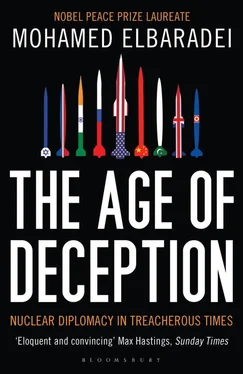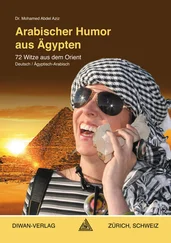As the Agency’s understanding of the Khan network matured, we also learned of the “watch-and-wait” strategy that had been employed by Western intelligence agencies. American officials claimed they had known about Khan’s activities all along but had decided not to act. If true, this made nonsense of the American claim that the discovery of Libya’s WMD was a triumph of intelligence work. Ruud Lubbers, the former Dutch prime minister, told me that the Dutch had wanted to arrest Khan as early as the 1970s, only to be told not to by the CIA. This was corroborated by other sources. Seymour Hersh, writing in the New Yorker in March 2004, reported a senior U.S. intelligence officer as saying, “We had every opportunity to put a stop to the A. Q. Khan network fifteen years ago. Some of those involved today in the smuggling are the children of those we knew about in the eighties. It’s the second generation now.” [11] Seymour M. Hersh, “The Deal,” New Yorker , March 8, 2004.
Robert Einhorn, who held the post of U.S. assistant secretary for nonproliferation from 1991 to 2001, later made a similar statement: “We could have stopped the Khan network, as we knew it, at any time. The debate was, do you stop it now or do you watch it and understand it better so that you are in a stronger position to pull it up by the roots later? The case for waiting prevailed.” [12] Robert Einhorn was quoted in Douglas Frantz, “A High-Risk Nuclear Stakeout,” Los Angeles Times , February 27, 2005.
“Can you explain what was gained?” I wanted to shout. Where were all the bigger fish who should now be ready for the catch? How could the IAEA expect to make headway against nuclear proliferation if vital information was withheld from us? Was there no recognition in the United States—or in the United Kingdom, or other countries that had known about A. Q. Khan—of their obligation, as a member of the NPT, to inform the IAEA of such underground dealings? Even more to the point, would it not have made more sense to stop the clandestine programs of Iran, Libya, and others in their infancy?
Whatever the circumstances or arguments at the time, in hindsight the decision to watch and wait was a royal blunder. Among the ways in which the strategy backfired was that it alerted members of the network. Interviews with middlemen have suggested that, at least in some cases, they knew for some time that they were under surveillance. This allowed them to destroy extensive records, which in turn made it difficult for the IAEA and other investigators to pin down additional dimensions of the network, including the identities of other customers.
Did Khan have other customers? Robert Gallucci has referred to A. Q. Khan as the Johnny Appleseed of nuclear enrichment for his role in spreading centrifuge technology far and wide. Khan’s travels took him across the Middle East and Africa. In most cases, there is little record of what happened in those places. But rumors persist and disturbing signs sometimes emerge.
When I visited one of the Gulf States in 2004, for example, a senior member of the royal family told me that Khan had been trying to sell them nuclear hardware for two years. The government had feigned interest, sending an agent to try to elicit information about the network’s dealings with Iran. Additional countries came forward with similar stories. In all likelihood, variations on this narrative had taken place in many locations. Is it not probable that, faced with such an opportunity, some customers did more than window-shop?
My ultimate nightmare is that the network’s ability to make nuclear material, equipment, and know-how available to anyone with cash in hand might have led to the creation of a small enrichment operation in a remote area such as northern Afghanistan. [13] Mentioned in Hersh, “The Deal.”
Given the increasing technological sophistication of extremist groups, this should no longer be regarded as a macabre fairy tale.
The demise of A. Q. Khan may have removed the mastermind from the operation, but there is no assurance that the network is no longer capable of supplying interested clients. As Sam Nunn remarked about the network’s trade in nuclear weapon components, “When you see the kind of money involved, and the stakes involved, and the spread of this kind of technology around the world, it’s virtually inevitable.” [14] Steve Coll, “The Atomic Emporium: Abdul Qadeer Khan and Iran’s Race to Build the Bomb,” New Yorker , August 2006.
Abdul Qadeer Khan made it his life’s work to level the nuclear weapons playing field for Muslim countries, to establish security parity with Israel’s nuclear weapons program, and to make money in the process. The eradication of his nuclear bazaar may yet take some time.
There are three morals to the story. First, as illustrated by Israel’s role in the Middle East and by India’s role in South Asia, proliferation begets proliferation. Second, while export controls should be significantly stronger, they can no longer be considered a remedy: the technology is out of the tube. And third, so long as nuclear weapons exist and bring power and prestige to their owners, we will continue to see proliferation, especially in countries and regions that perceive themselves to be under threat.
In the summer of 2004, as my second term leading the IAEA approached its conclusion, my inclination was not to seek a third term, despite the urging of most Member States. The job came with considerable stress, and my family’s preference was that I give it up. Then came U.S. interference.
I had been given to understand that should I choose to run again, the United States would respect my decision. In August, while on vacation at my summer home in Egypt, I was told to expect a call from Colin Powell confirming that position. This expression of support was not all that surprising. The past few months had seen a very positive series of meetings with American officials, including Bush himself.
But the call did not come. Shortly after I returned to Vienna, I learned from my deputy David Waller that the tone in the United States had changed. “I’ve just gotten back from Washington,” he said. “We need to talk.” Walking with David in Belvedere Park, across from my home, I heard that the U.S. view had shifted. John Bolton had launched a campaign to block my reappointment by invoking the seldom-applied limit of two terms to the tenure of UN Agency heads. Bolton had called David to say that if I agreed to step down, the United States would express effusive appreciation of my work for the past eight years.
I was furious. Bolton was my ideological opposite, a champion of “us-versus-them” foreign policy; he opposed multilateral diplomacy and consistently worked behind the scenes to discredit the IAEA, often blocking efforts to resolve nuclear proliferation issues peacefully. He strove to undermine everything I stood for. That he would presume to dictate whether I ran for a third term was intolerable. The irony was not lost on me: the United States, which had backed my first term as Director General against Egypt’s preferred choice was now calling for my ouster. [1] At the time of my first election as Director General, in 1997, Egypt had put its support behind Mohamed Shaker, Egyptian ambassador to the United Kingdom and a close friend of President Hosni Mubarak’s family.
That evening I talked things over with Aida, my wife. We quickly agreed that I should stand for a third term. If I won, it would be a vindication of multilateral diplomacy and a clear mandate to press for a negotiated resolution in Iran and in other trouble spots. If I lost, I would still have stood up against U.S. bullying. The next morning I wrote to the chairman of the IAEA Board declaring my candidacy for reelection.
Читать дальше












